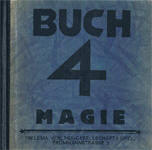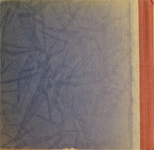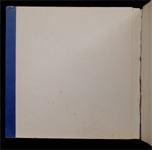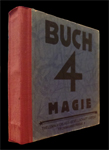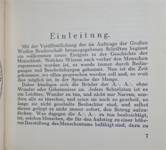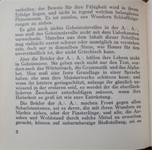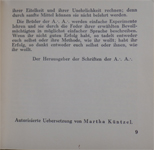100th
MP

|
THE
100th
MONKEY
PRESS |
|
|
|
Limited Editions by Aleister Crowley & Victor B. Neuburg |
|
Bibliographies |
|
Download Texts
»
Aleister
Crowley
WANTED !!NEW!!
|
|
BUCH Veir II. TEIL MAGIE |
|
Image Thumbnails |
||||||
|
Title: |
Buch Veir II. Teil Magie (Book 4 Part II, Magick) |
|
||||
|
Variations: |
|
|||||
|
Publisher: |
Thelema-Verlags-Gesellschaft.2 |
|||||
|
Printer: |
|
|||||
|
Published At: |
Leipzig, Germany.2 |
|||||
|
Date: |
1927.1 |
|||||
|
Edition: |
First German Edition. |
|||||
|
Pages: |
265 pages.2 |
|||||
|
Price: |
4 Reichsmarks.1 |
|||||
|
Remarks: |
Translated by Martha Küntzel.2 |
|||||
|
Pagination: |
|
|||||
|
Contents: |
|
|||||
|
Author’s Working Versions: |
|
|||||
|
Other Known Editions: |
|
|||||
|
Bibliographic Sources: |
|
|||||
|
Comments by Aleister Crowley: |
She was very unsatisfactory as a clairvoyant; she resented these precautions. She was a quick-tempered and impulsive woman, always eager to act with reckless enthusiasm. My cold scepticism no doubt prevented her from doing her best. Ab-ul-Diz himself constantly demanded that I should show “faith” and warned me that I was wrecking my chances by my attitude. I prevailed upon him, however, to give adequate proof of his existence and his claim to speak with authority. The main purport of his message was to instruct me to write a book on my system of mysticism and Magick, to be called Book Four, and told me that by means of this book, I should prevail against public neglect. It saw no objection to writing such a book; on quite rational grounds, it was a proper course of action, I therefore agreed to do so. But Ab-ul-Diz was determined to dictate the conditions in which the book should be written; and this was a difficult matter. He wanted us to travel to an appropriate place. On this point I was not wholly satisfied with the result of my cross-examination. I know now that I was much to blame throughout. I was not honest either with him, myself or Virakam. I allowed material considerations to influence me, and I clung—oh triple fool!—to my sentimental obligations towards Laylah. We finally decided to do what he asked, though part of my objection was founded on his refusal to give us absolutely definite instructions. However, we crossed the passes in a sleigh to Chiavenna, whence we took the train to Milan. In this city we had a final conversation with Ab-ul-Diz. I had exhausted his patience, as he mine, and he told us that he would not visit us any more. He gave us his final instructions. We were to go to Rome and beyond Rome, though he refused to name the exact spot. We were to take a villa and there write Book Four. — The Confessions of Aleister Crowley. New York, NY. Hill and Wang, 1969. Pages 677-678. ______________________________
The idea was as follows. I was to dictate; Virakam to transcribe, and if at any point there appeared the slightest obscurity—obscurity from the point of view of the entirely ignorant and not particularly intelligent reader; in a word, the average lower-class man in the street—I was to recast my thoughts in plainer language. By this means we hoped to write a book well within the compass of the understanding of even the simplest-minded seeker after spiritual enlightenment. Part One of Book Four expounds the principles and practice of mysticism in simple scientific terms stripped of all sectarian accretion, superstitious enthusiasms or other extraneous matter. It proved completely successful in this sense.
Part Two deals with the principles and practice of Magick. I
explained the real meaning and modus operandi of all the
apparatus and technique of Magick. Here, however, I partially
failed. I was stupid enough to assume that my readers were
already acquainted with the chief classics of Magick. I
consequently described each Weapon, explained it and gave
instructions for its use, without making it clear why it should
be necessary at all. Part Two is therefore an wholly admirable
treatise only for one who has already mastered the groundwork
and gained some experience of the practice of the art. — The Confessions of Aleister Crowley. New York, NY. Hill and Wang, 1969. Page 680. |
|||||
|
Reviews: |
|
|||||
